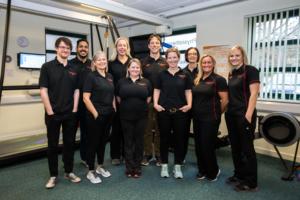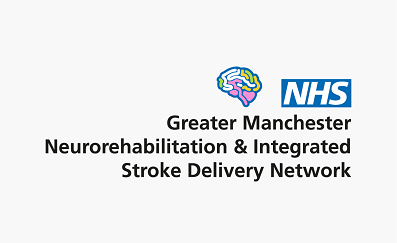Greater Manchester Neurorehabilitation Annual Conference
Events
Summit Medical and Scientific are delighted to be demonstrating stroke recovery technology at the Neurorehabilitation Annual Conference of the Greater Manchester Neurorehabilitation and Integrated Stroke Delivery Network. View the full #GMNISDN22 programme here.
Taking place on 12th October at the AJ Bell Stadium in Manchester, the conference features a range of topics including keynote speaker Professor Andrew Bateman, who will be speaking about “Where next for neuro-rehab innovation?”
Find us in the refreshment area where we will be demonstrating three of our rehabilitation devices for stroke recovery:
- The Andago free-moving robotic body weight support system for gait and balance training. Read more.
- The ArmeoSpring adjustable exoskeleton for moderate upper limb impairment. Read more.
- The ArmeoSenso sensor-based device for moderate to mild upper limb impairment. Read more.
The total solution for neurorehabilitation
Summit Medical and Scientific represent clinical technology leaders Hocoma and Motek to provide the total solution for neurorehabilitation. Our partners have developed innovative therapy devices using robotics, sensors and virtual reality for early and acute rehabilitation, gait and balance therapy, arm and hand therapy, body weight support and more. Click here to view all of our clinical solutions.
We are proud to supply this latest rehabilitation technology to clinics, NHS hospitals, charities and military facilities across the UK, including the new Cleveland Clinic London, Royal Bournemouth Hospital Acute Stroke Unit, the Brain and Spinal Injury Centre (BASIC), the Defence and National Rehabilitation Centre (DNRC), Ascot Rehab, Neural Pathways, and Morrello Clinic.
You can read our latest contributions to stroke recovery and rehabilitation technology in the recent “Innovations in Stroke” special report in the Stroke Rehab Times. Click here to read the report.
Integrating robotic technology into NHS stroke services
“My stroke stole my ability to walk, strapped into the Lokomat I could walk again. It was fantastic. The Lokomat also allowed me to exercise my weak leg in ways that were impossible outside of it. As a result of this my leg grew stronger and I can now walk with a frame. I owe this to Sophie, her splendid team and the Lokomat.”
The University Hospitals Dorset NHS Foundation Charity “Walkerbot” appeal raised funds to purchase the Hocoma Lokomat robotic gait trainer for their Acute Stroke Unit at the Royal Bournemouth Hospital. Read more about the charity’s fundraising appeal.
Dr Louise Johnson, Consultant Therapist at University Hospitals Dorset, said:
“We identified [the Lokomat] as something that we wanted to provide within our stroke service because we know it’s got a really strong evidence base. We know it works for people with stroke, it’s recommended in our national guidelines for stroke, yet as far as we were aware, no stroke services in the UK offer patients access to this kind of service. So we wanted to do something about that and be one of the first to be able to offer patients access to such incredible technology. It is really exciting for staff to be able to work in a service that is able to offer the most up-to-date technology so we are really excited about being trained how to use [the Lokomat], to be able to offer that to patients who access our services and get the best outcomes for our patients.
So for patients who are unable to walk after a stroke or patients whose legs have been affected by the stroke, [the Lokomat] will give them the opportunity to practice really high repetitions within their rehabilitation. So at the moment, we would support patients to relearn how to sit and stand and step if they’re able to. But we can only do that at quite low intensity, and the use of robotics enables us to do that at much higher intensity, which we know has an impact on people’s recovery and ultimately their outcomes.”
Using virtual reality technology daily with stroke patients

Morrello Clinic use the Motek C-Mill virtual reality treadmill as part of their day to day treatment options for their neurological patients.
“The patient attended our clinic two times per week for two-hour therapy sessions. Her goal at the start of treatment was to be able to walk her children to the nursery with one walking stick. The C-Mill treadmill was chosen, because of the possibilities of work on gait adaptability and its virtual reality features. The ability to change gait parameters and challenge gait and balance in a safe and controlled way, were other reasons why this device was chosen.”
Contact
Visit our stand at #GMNISDN22 to meet our team and find out how you can integrate robotic rehabilitation technology into your clinical practice or NHS services. If you’re tuning in remotely and want to chat to our team, please email us on info@summitmedsci.co.uk or phone 01372 459863.

